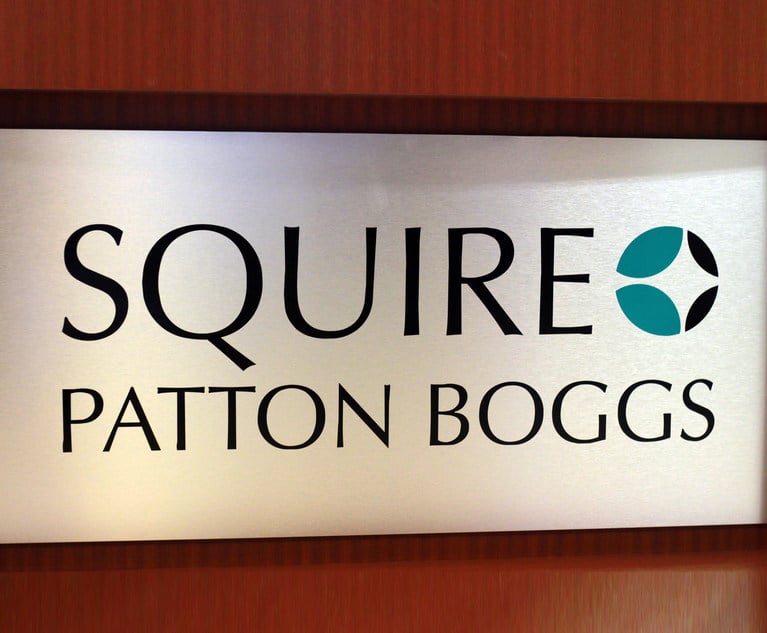Freshfields to Review Modified Lockstep After Less Than a Year
Former partners say the magic circle firm is 'opening a can of worms' in considering further tweaks to its pay structure.
February 27, 2019 at 06:22 AM
4 minute read
 Freshfields Bruckhaus Deringer
Freshfields Bruckhaus Deringer
Freshfields Bruckhaus Deringer is reviewing its modified lockstep model less than a year since its introduction, according to people inside the firm.
It follows the latest raft of high-profile exits from the firm, most notable of which was private equity partner Adrian Maguire's departure to Kirkland & Ellis last month.
In May 2018, the firm ushered in a new single ladder that enabled top performers to make six times more than those at the bottom, lengthening the points scale from 17.5 to 50, to 12 to 60, in a bid to retain star talent. This increased the amount partners could earn at the very top of the lockstep from about £2.2 million to £3 million.
However, just nine months on, several partners at the firm said its management is once again looking at the remuneration model, meaning yet another shake-up could be on the horizon.
Some partners said the decision would be agreed by consensus, whereas others suggested any changes would come down to decisions made by senior partner Edward Braham and managing partner Stephan Eilers.
One avenue the firm could go down, according to one Freshfields partner, is to stretch the lockstep in the middle, allowing younger partners to be paid more, while bundling it together more tightly at the top.
A former partner said he expected the firm to remove the lockstep altogether for partners based in New York and Hong Kong, where the firm's biggest earners are concentrated.
However, senior partner Edward Braham maintained his commitment to the lockstep model in a statement to Legal Week. He said: "Our remuneration model supports our strategy of delivering the best-quality advice for our clients working in effective cross-border teams; the principle of a global lockstep is fundamental to our partnership."
Braham and the firm declined to comment further on the review.
Another partner at the firm said it was unlikely management would make any considerable changes, but rather "tweaks".
Last year's modifications – the first such changes in the magic circle firm's 276-year history – caused some internal "concern", according to insiders, with more than 60 partners seeing their profit share reduced. Certain partners were asked to move down the points scale to accommodate the top-end extension.
But the changes failed to stem a flow of exits from the firm. Since the lockstep was modified, high-profile partner departures have included corporate and capital markets heavyweight Ashar Qureshi, who left for US firm Fried Frank in September; top-ranked high-yield partner Ward McKimm, who rejoined Shearman & Sterling last summer; and litigation partner Reza Mohtashami QC, who reunited with his former colleagues at Freshfields-breakaway boutique, Three Crowns.
The possibility of further changes to the already modified lockstep model is likely to be divisive, former partners believe. One said it would be "putting a sticking plaster on things", while another said it would "open a can of worms".
One ex-partner said: "Freshfields management didn't go the last mile [with the last reform]. It is not sufficient or the right approach – if you have very successful younger partners, they still need to move up the ladder before they can see good pay."
They pointed out, however, that even with further reforms, they will not be able to match the pay of the top U.S. firms.
A former partner based in Germany said partners in the German market who are at the top of the lockstep were aggrieved at the firm's previous changes and would not welcome further destablisation of their pay.
Meanwhile, a Freshfields partner in the U.S. said: "We've lost a bunch of really good PE stars in London and we need to think hard about that. I've not heard of anything happening over here, but I'd feel bad if management wasn't thinking about it. The London market is becoming as competitive as it is here."
One City rival added: "These things happen when you start tweaking the lockstep to appease the incumbent generation. It gets tweaked, it'll get re-tweaked."
This content has been archived. It is available through our partners, LexisNexis® and Bloomberg Law.
To view this content, please continue to their sites.
Not a Lexis Subscriber?
Subscribe Now
Not a Bloomberg Law Subscriber?
Subscribe Now
NOT FOR REPRINT
© 2025 ALM Global, LLC, All Rights Reserved. Request academic re-use from www.copyright.com. All other uses, submit a request to [email protected]. For more information visit Asset & Logo Licensing.
You Might Like
View All
Squire Patton Boggs Hires 7-Lawyer Team to Beef Up ESG Practice in Brussels
2 minute read

Kirkland’s O’Shea Acts Alongside Former Outfit Simpson Thacher on KKR Deal
2 minute read
King & Spalding and Ex-Partner Accused of Fraud After Client Claims £1.7 Million Deposit Loss
2 minute readTrending Stories
- 1The New Rules of AI: Part 2—Designing and Implementing Governance Programs
- 2Plaintiffs Attorneys Awarded $113K on $1 Judgment in Noise Ordinance Dispute
- 3As Litigation Finance Industry Matures, Links With Insurance Tighten
- 4The Gold Standard: Remembering Judge Jeffrey Alker Meyer
- 5NJ Supreme Court Clarifies Affidavit of Merit Requirement for Doctor With Dual Specialties
Who Got The Work
J. Brugh Lower of Gibbons has entered an appearance for industrial equipment supplier Devco Corporation in a pending trademark infringement lawsuit. The suit, accusing the defendant of selling knock-off Graco products, was filed Dec. 18 in New Jersey District Court by Rivkin Radler on behalf of Graco Inc. and Graco Minnesota. The case, assigned to U.S. District Judge Zahid N. Quraishi, is 3:24-cv-11294, Graco Inc. et al v. Devco Corporation.
Who Got The Work
Rebecca Maller-Stein and Kent A. Yalowitz of Arnold & Porter Kaye Scholer have entered their appearances for Hanaco Venture Capital and its executives, Lior Prosor and David Frankel, in a pending securities lawsuit. The action, filed on Dec. 24 in New York Southern District Court by Zell, Aron & Co. on behalf of Goldeneye Advisors, accuses the defendants of negligently and fraudulently managing the plaintiff's $1 million investment. The case, assigned to U.S. District Judge Vernon S. Broderick, is 1:24-cv-09918, Goldeneye Advisors, LLC v. Hanaco Venture Capital, Ltd. et al.
Who Got The Work
Attorneys from A&O Shearman has stepped in as defense counsel for Toronto-Dominion Bank and other defendants in a pending securities class action. The suit, filed Dec. 11 in New York Southern District Court by Bleichmar Fonti & Auld, accuses the defendants of concealing the bank's 'pervasive' deficiencies in regards to its compliance with the Bank Secrecy Act and the quality of its anti-money laundering controls. The case, assigned to U.S. District Judge Arun Subramanian, is 1:24-cv-09445, Gonzalez v. The Toronto-Dominion Bank et al.
Who Got The Work
Crown Castle International, a Pennsylvania company providing shared communications infrastructure, has turned to Luke D. Wolf of Gordon Rees Scully Mansukhani to fend off a pending breach-of-contract lawsuit. The court action, filed Nov. 25 in Michigan Eastern District Court by Hooper Hathaway PC on behalf of The Town Residences LLC, accuses Crown Castle of failing to transfer approximately $30,000 in utility payments from T-Mobile in breach of a roof-top lease and assignment agreement. The case, assigned to U.S. District Judge Susan K. Declercq, is 2:24-cv-13131, The Town Residences LLC v. T-Mobile US, Inc. et al.
Who Got The Work
Wilfred P. Coronato and Daniel M. Schwartz of McCarter & English have stepped in as defense counsel to Electrolux Home Products Inc. in a pending product liability lawsuit. The court action, filed Nov. 26 in New York Eastern District Court by Poulos Lopiccolo PC and Nagel Rice LLP on behalf of David Stern, alleges that the defendant's refrigerators’ drawers and shelving repeatedly break and fall apart within months after purchase. The case, assigned to U.S. District Judge Joan M. Azrack, is 2:24-cv-08204, Stern v. Electrolux Home Products, Inc.
Featured Firms
Law Offices of Gary Martin Hays & Associates, P.C.
(470) 294-1674
Law Offices of Mark E. Salomone
(857) 444-6468
Smith & Hassler
(713) 739-1250








